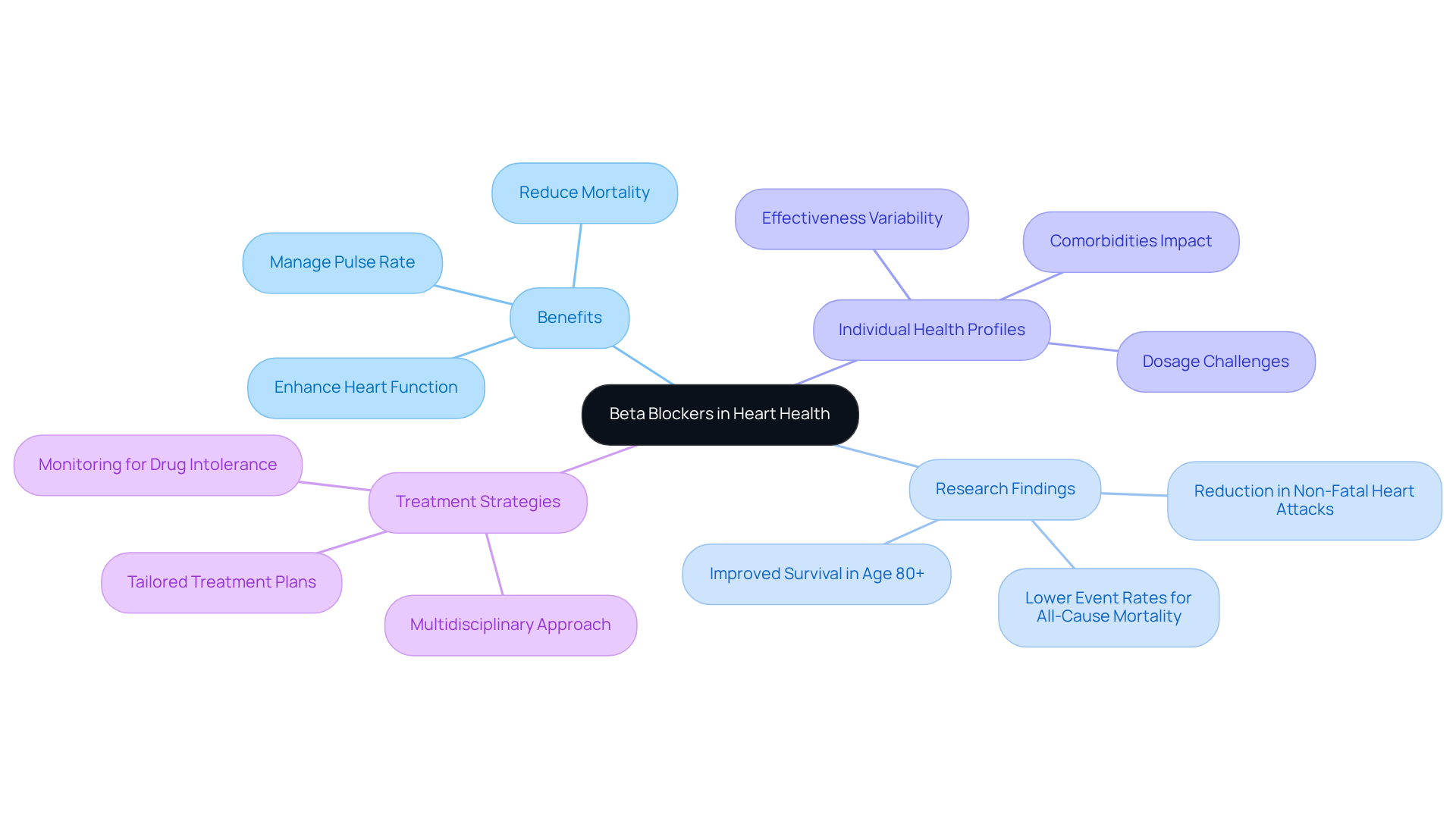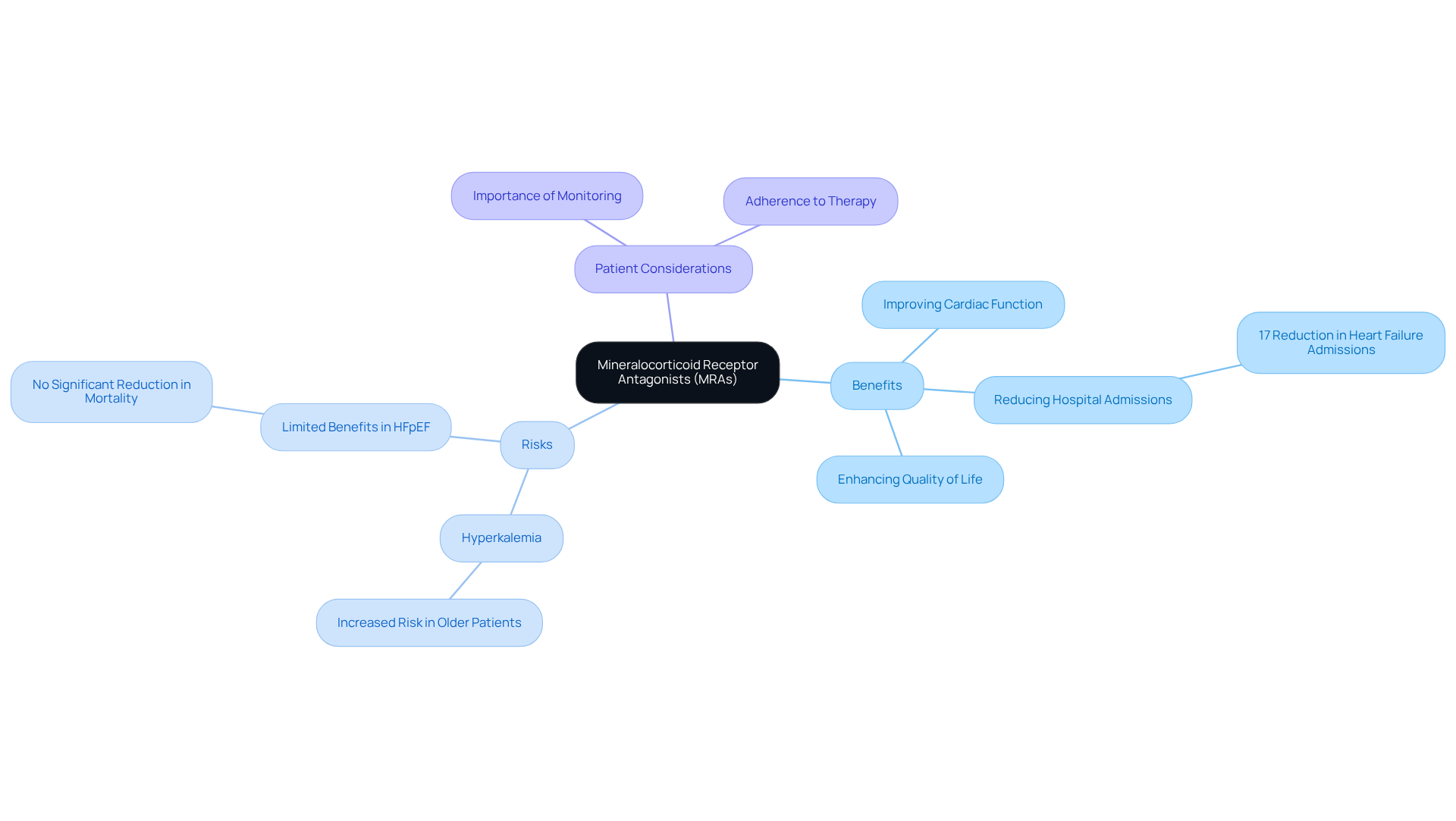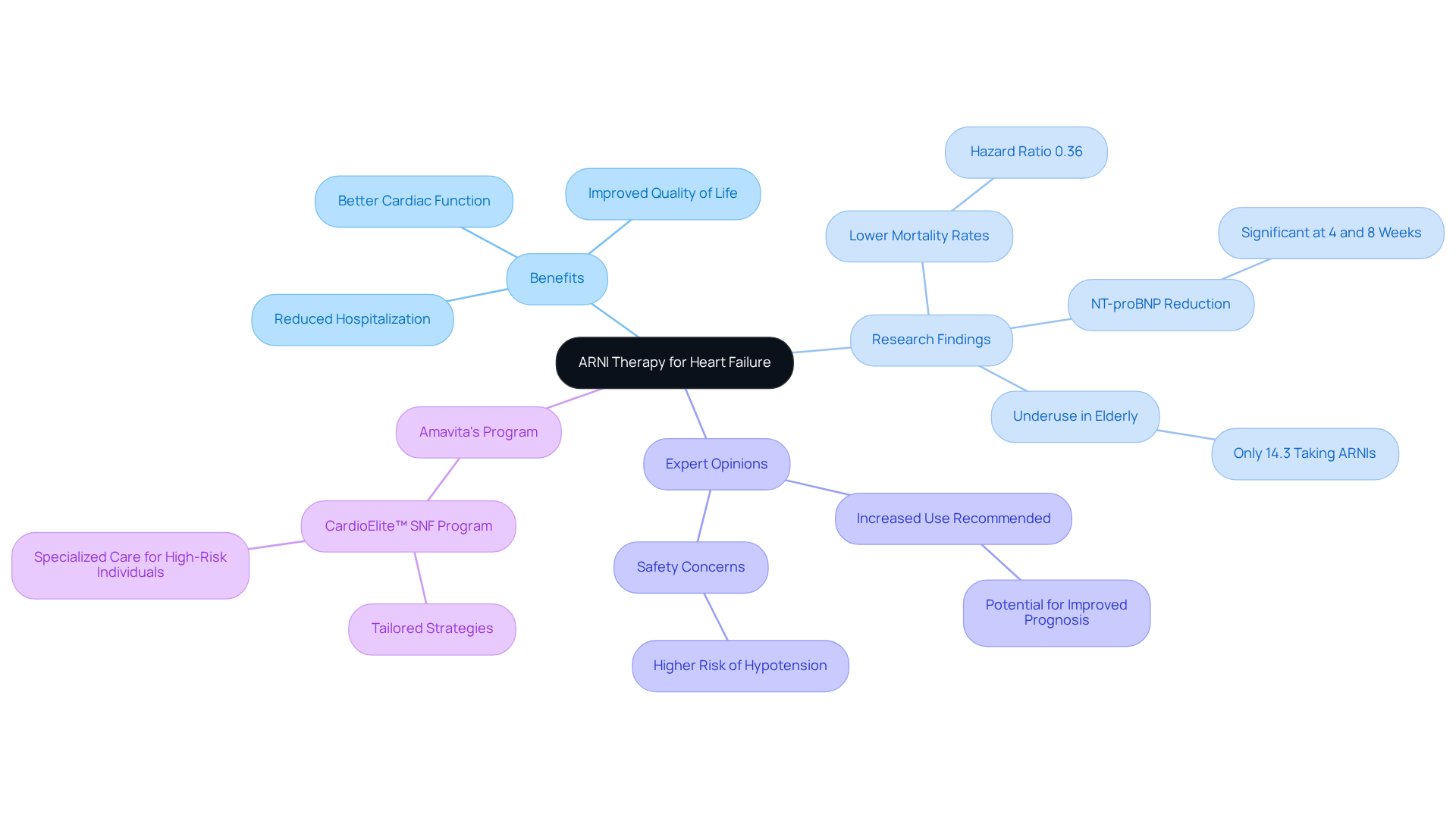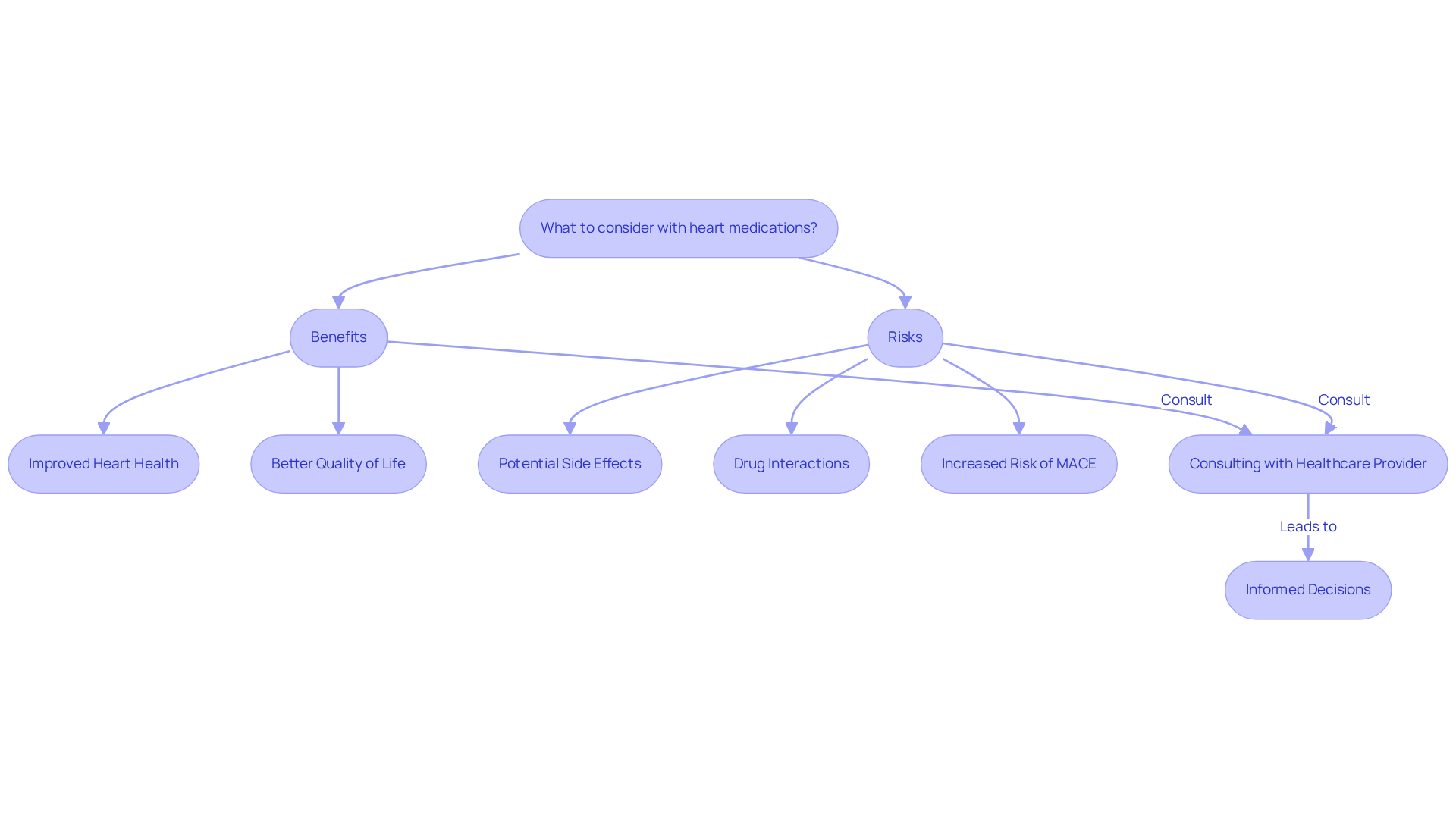


This article highlights essential heart medications that every patient should be aware of, especially those critical for managing cardiovascular health. It introduces key medications such as:
Each medication is explained in terms of its role and benefits, particularly for improving outcomes in patients, especially the elderly.
In addition to discussing medications, it emphasizes the necessity of personalized treatment plans and careful monitoring. This approach not only addresses the unique needs of each patient but also reassures them that their health is in caring hands. If you or a loved one have concerns about heart health, please remember that support and guidance are available to help navigate these important decisions.
Understanding heart health is crucial for anyone navigating the complexities of cardiovascular care, especially for older adults facing multiple health challenges. This article explores ten essential heart medications that every patient should be familiar with, highlighting their roles, benefits, and the significant impact they can have on overall well-being.
Yet, with so many options available, how can patients ensure they are making informed choices about their treatment? By exploring the nuances of these medications, individuals are empowered to take charge of their health, while also raising important questions about the balance between benefits and potential risks.
Remember, you are not alone in this journey; support is available to help you make the best choices for your heart health.
At Amavita Heart and Vascular Health, we understand that managing cardiovascular health can feel overwhelming, especially for individuals with multiple health concerns. Our comprehensive cardiovascular medication management is designed with you in mind, emphasizing innovative and compassionate care tailored to your unique health profile. We prioritize personalized treatment plans, particularly for our elderly patients, ensuring that you feel supported every step of the way.
By integrating advanced treatment strategies with our commitment to enhancing your quality of life, we ensure that you receive the most effective therapies to manage your cardiovascular health. In addition to this, our advanced outpatient procedures allow you to return home the same day, minimizing the stress of hospital stays and readmissions. Our CardioElite™ SNF Program exemplifies this dedication, achieving an impressive 93% reduction in readmissions, which speaks to our focus on your well-being.
We invite you to reach out and learn more about how we can support you in your health journey. Your comfort and health are our top priorities, and we are here to provide the .

Heart medication names, like Angiotensin-Converting Enzyme (ACE) inhibitors such as lisinopril and enalapril, are vital in treating cardiac insufficiency, particularly for our older loved ones. These medications work by relaxing blood vessels, which helps lower blood pressure and reduces the strain on the heart. Research has shown that ACE inhibitors can lead to better cardiovascular outcomes and lower mortality rates in older adults facing hypertension and heart failure. For instance, a study involving over 6,000 individuals aged 65 to 84 found that ACE inhibitors significantly decreased cardiovascular events and overall mortality, underscoring their effectiveness in this age group.
In clinical practice, heart medication names like lisinopril and enalapril are commonly prescribed to older adults, often leading to noticeable improvements in symptoms like shortness of breath and fatigue. These medications not only enhance physical health but also contribute to a better quality of life, allowing individuals to engage more fully in daily activities. Additionally, ACE inhibitors have proven beneficial in managing comorbid conditions, such as chronic kidney disease, which is often found in older populations.
Ongoing studies are exploring the broader effects of ACE inhibitors on cardiac dysfunction. Research suggests that these medications might help delay the progression of heart issues and , especially in those with diabetes. Regular monitoring of kidney function and electrolytes is essential, as older adults may be more susceptible to side effects like low blood pressure and high potassium levels. Overall, incorporating ACE inhibitors into treatment plans for cardiac dysfunction in older individuals reflects a commitment to enhancing health outcomes and quality of life.

Beta blockers, such as metoprolol and carvedilol, are vital in helping to manage pulse rate and blood pressure, particularly for our older loved ones facing cardiovascular challenges. These medications offer and for individuals recovering from heart attacks. By effectively easing the heart's workload, beta blockers not only enhance overall heart function but also promote better long-term health outcomes.
Research indicates that the use of beta blockers is associated with a meaningful reduction in all-cause mortality and cardiovascular events among older adults, highlighting their importance in treatment plans. Cardiologists point out that while the benefits of beta blockers are well-established, their effectiveness can vary based on individual health profiles, especially in older patients who may have multiple health conditions.
For instance, studies show that in individuals aged 80 and above, beta blockers have been linked to improved survival rates. However, achieving the right dosage can be challenging due to the changes in how the body processes medications with age.
Overall, incorporating heart medication names, including beta blockers, into treatment strategies for older adults with cardiovascular issues is essential for enhancing recovery and effectively managing heart health. If you or someone you care about is navigating these health challenges, reaching out for support can make a significant difference in managing these conditions with confidence and care.

Diuretics, such as furosemide and spironolactone, play a crucial role in managing fluid retention for individuals facing heart failure. These medications promote the excretion of excess fluid, helping to alleviate uncomfortable symptoms like swelling and shortness of breath. At Amavita Heart and Vascular Health®, we prioritize your well-being through comprehensive cardiac evaluations and advanced imaging capabilities. We are dedicated to creating personalized treatment plans that cater to your specific conditions and lifestyle needs.
Effective management of fluid retention through targeted cardiovascular care can significantly enhance your comfort and mobility. Imagine returning to your daily activities with greater ease and less worry. We understand that can be daunting, but you are not alone on this journey. Our compassionate team is here to support you every step of the way, ensuring that your health is managed with the utmost care and understanding.

Sodium-glucose cotransporter 2 (SGLT2) inhibitors, such as empagliflozin and dapagliflozin, have emerged as transformative choices in managing cardiac dysfunction. These medications not only help in controlling blood sugar levels for those with diabetes but also offer significant cardiovascular benefits, particularly in reducing hospitalization rates for heart-related issues. Research indicates that SGLT2 inhibitors are associated with an impressive for cardiac concerns compared to other diabetes treatments. This is especially beneficial for older adults who often face various health challenges.
The way SGLT2 inhibitors work enhances their effectiveness in treating heart conditions. By promoting diuresis and alleviating fluid overload, these medications relieve pressure on the cardiovascular system, leading to improved outcomes. Notably, studies have shown that starting SGLT2 inhibitors during hospital stays can significantly reduce the rates of cardiovascular rehospitalization. Inpatients who began treatment while hospitalized experienced a rehospitalization rate of 22.3%, compared to 44.4% for those who started after discharge.
Empagliflozin and dapagliflozin have demonstrated reliable advantages across diverse groups, including individuals both with and without a history of cardiac issues. Their inclusion in treatment protocols reflects the growing recognition of heart medication names as essential components in managing heart problems, particularly among older individuals. As the evidence supporting their use continues to grow, SGLT2 inhibitors are poised to play a vital role in enhancing the quality of care for those experiencing cardiac challenges.
If you or a loved one are navigating these health concerns, consider discussing SGLT2 inhibitors with your healthcare provider. They may offer a supportive option in your journey towards better heart health.

Mineralocorticoid receptor antagonists (MRAs), which are heart medication names like spironolactone and eplerenone, play a vital role in enhancing cardiac function for those experiencing cardiac dysfunction. These medications are particularly effective in preventing fluid retention, which is essential for lowering the risk of hospitalization. For senior patients, the benefits extend beyond mere symptom control; they significantly improve quality of life by alleviating the difficulties associated with cardiac issues.
Have you ever wondered how a small change in medication can lead to such a positive impact? Studies reveal that treatment with spironolactone can reduce hospital admissions related to heart failure by 17%, underscoring its effectiveness in this demographic. Furthermore, research has shown that MRAs can improve diastolic function and reduce myocardial fibrosis—both crucial for maintaining cardiovascular health in older adults.
However, it’s important to recognize that MRAs, particularly spironolactone, carry a higher risk of hyperkalemia, which requires careful monitoring in older individuals. Additionally, certain subgroups of patients with preserved ejection fraction (HFpEF) may not experience the same benefits from spironolactone. The TOPCAT trial highlighted that there was no significant reduction in cardiovascular mortality or hospitalizations for this group.
Cardiologists emphasize that spironolactone is one of the important heart medication names that not only aids in managing cardiac concerns but also contributes to better overall health outcomes, making it a cornerstone in the treatment of older adults with cardiovascular conditions.
To optimize the benefits of MRAs in this vulnerable population, to therapy are essential. Remember, you are not alone in this journey; support is available, and taking these steps can lead to a healthier, more fulfilling life.

Hydralazine and isosorbide dinitrate are often used together as a targeted therapy for organ failure, especially for those who may not tolerate ACE inhibitors. This combination works by widening blood vessels, which helps to reduce the workload on the heart and improve blood circulation. At Amavita Heart and Vascular Health, we view this therapy as part of a holistic approach to cardiovascular care, particularly beneficial for older adults managing symptoms and striving for better heart health.
By utilizing advanced diagnostic tools, including sophisticated imaging capabilities, we create personalized treatment plans that ensure high-risk individuals receive the specialized care they need to improve outcomes and reduce hospital readmissions. This method addresses the unique cardiovascular challenges faced by skilled nursing facilities, ensuring that each patient receives the most effective and tailored care possible.
If you or a loved one are navigating heart health challenges, know that you are not alone. Our compassionate team is here to support you every step of the way. Together, we can work towards and overall well-being.
For individuals who find ACE inhibitors challenging to tolerate, angiotensin-2 receptor blockers (ARBs) like losartan and valsartan emerge as valuable alternatives. These medications not only effectively but also alleviate pressure on the cardiovascular system, making them particularly beneficial for managing heart failure. For older adults, ARBs offer comparable benefits to ACE inhibitors, often with a more favorable side effect profile, which is crucial for this demographic.
Research shows that ARBs can significantly improve cardiac function and enhance quality of life, especially for older adults dealing with cardiovascular issues. Additionally, studies indicate that ARBs, including losartan and valsartan, are effective in reducing morbidity and mortality rates among individuals with cardiac dysfunction. This makes them a reliable choice for those unable to tolerate traditional treatments.
As healthcare professionals continue to explore various treatment options, ARBs stand out as a safe and effective means of improving cardiovascular health in older adults. In conjunction with comprehensive programs like Amavita's CardioElite™, which integrates advanced diagnostic tools, AI technology, and staff training, the use of ARBs can contribute to a holistic approach aimed at reducing hospital readmissions and improving overall outcomes in skilled nursing facilities.
If you or a loved one are navigating these health challenges, know that there are compassionate options available. Seeking guidance from healthcare professionals can lead to a supportive path toward better heart health.

Are you or a loved one facing challenges with cardiovascular health? The combination of an angiotensin receptor blocker (ARB) and a neprilysin inhibitor (ARNI), such as sacubitril/valsartan, has emerged as a new standard in treating cardiovascular failure, particularly within Amavita's CardioElite™ SNF Program. This groundbreaking treatment not only effectively reduces blood pressure but also significantly boosts cardiac function, leading to better outcomes for older individuals.
Research shows that ARNI therapy is associated with a notable reduction in hospitalization rates, which is especially beneficial for older adults who often deal with multiple health concerns. Indeed, studies have demonstrated that therapy with sacubitril/valsartan can enhance quality of life while reducing failure-related incidents. Experts in cardiology emphasize that increasing the use of ARNIs in this demographic could greatly improve overall prognosis.
The positive impacts of ARNI therapy underscore its importance in managing cardiac failure, making it a vital option for older individuals looking to enhance their cardiovascular wellness and minimize hospital visits. At Amavita Heart and Vascular Health®, we are dedicated to providing specialized cardiovascular care for high-risk individuals through advanced imaging and thorough assessments. We ensure that our clients receive tailored, for their cardiac health, because your well-being is our priority. If you have questions or need support, please reach out to us—we're here to help you every step of the way.

Understanding the dangers and advantages of is crucial, especially for seniors. These heart medication names can significantly improve heart health and overall quality of life, yet they also come with potential side effects and interactions with other drugs that must be considered.
Research indicates that more than half of older individuals take more than two medications, which increases the likelihood of adverse effects. It’s essential to engage in open discussions with healthcare providers to make informed treatment decisions. Such conversations can profoundly impact patient outcomes, as healthcare experts emphasize.
Dr. Jack V. Tu aptly noted, 'The decision to prescribe a medication should always be patient-focused, balancing the risks of side effects against the benefits of treatment.' Real-world experiences show that individuals who actively discuss their medication regimens with their doctors often manage side effects better and adhere more closely to treatment plans.
Additionally, using multiple MACE medications is linked to a significant two-fold increase in the risk of major adverse cardiovascular events (MACE). Therefore, nurturing a collaborative relationship with healthcare providers is vital for elderly patients as they navigate the complexities of heart medication names management.
Remember, you are not alone in this journey; seeking support and guidance can lead to better health outcomes.

Navigating the landscape of heart medications is crucial for anyone managing cardiovascular health. This article highlights the significance of understanding various heart medication names and their roles in enhancing treatment outcomes, particularly for older adults. By emphasizing personalized care, the insights shared underscore the importance of tailored treatment plans that prioritize individual health needs and quality of life.
Key arguments presented include the effectiveness of medications such as:
in managing heart failure and other cardiovascular conditions. Each medication serves a distinct purpose, from lowering blood pressure and controlling heart rate to managing fluid retention and improving overall heart function. In addition to this, the collaborative relationship between patients and healthcare providers is vital for optimizing treatment regimens and ensuring the best possible outcomes.
In conclusion, the journey toward better heart health is not one to be undertaken alone. By staying informed about essential heart medications and engaging in open dialogues with healthcare professionals, patients can navigate their treatment options with confidence. Embracing a proactive approach to cardiovascular care can lead to improved health outcomes, allowing individuals to enjoy a better quality of life. Seeking support and understanding the intricacies of heart medications is crucial, particularly for the elderly population facing multiple health challenges.
What is the focus of Amavita Heart and Vascular Health?
Amavita Heart and Vascular Health focuses on comprehensive cardiovascular medication management, emphasizing innovative and compassionate care tailored to individual health profiles, particularly for elderly patients.
How does Amavita ensure personalized treatment plans?
Amavita prioritizes personalized treatment plans by integrating advanced treatment strategies and enhancing quality of life, ensuring that patients feel supported throughout their health journey.
What is the CardioElite™ SNF Program?
The CardioElite™ SNF Program at Amavita exemplifies their dedication to patient well-being, achieving a 93% reduction in readmissions, which highlights their focus on effective care and minimizing hospital stays.
What role do Angiotensin-Converting Enzyme (ACE) inhibitors play in heart health?
ACE inhibitors, such as lisinopril and enalapril, are vital medications for treating cardiac insufficiency, as they relax blood vessels, lower blood pressure, and reduce strain on the heart, leading to better cardiovascular outcomes.
What benefits do ACE inhibitors provide for older adults?
ACE inhibitors have been shown to significantly decrease cardiovascular events and overall mortality in older adults, improving symptoms like shortness of breath and fatigue while enhancing their quality of life.
What are some potential side effects of ACE inhibitors in older adults?
Older adults may be more susceptible to side effects such as low blood pressure and high potassium levels, necessitating regular monitoring of kidney function and electrolytes.
How do beta blockers assist in managing heart health?
Beta blockers, such as metoprolol and carvedilol, help manage pulse rate and blood pressure, easing the heart's workload and enhancing overall heart function, particularly for those with cardiac failure or recovering from heart attacks.
What are the long-term health benefits of beta blockers for older adults?
Research indicates that beta blockers are associated with a meaningful reduction in all-cause mortality and cardiovascular events among older adults, improving survival rates, especially in individuals aged 80 and above.
Why is dosage adjustment important for beta blockers in older patients?
Achieving the right dosage of beta blockers can be challenging for older patients due to changes in how the body processes medications with age, making careful monitoring essential for effective treatment.